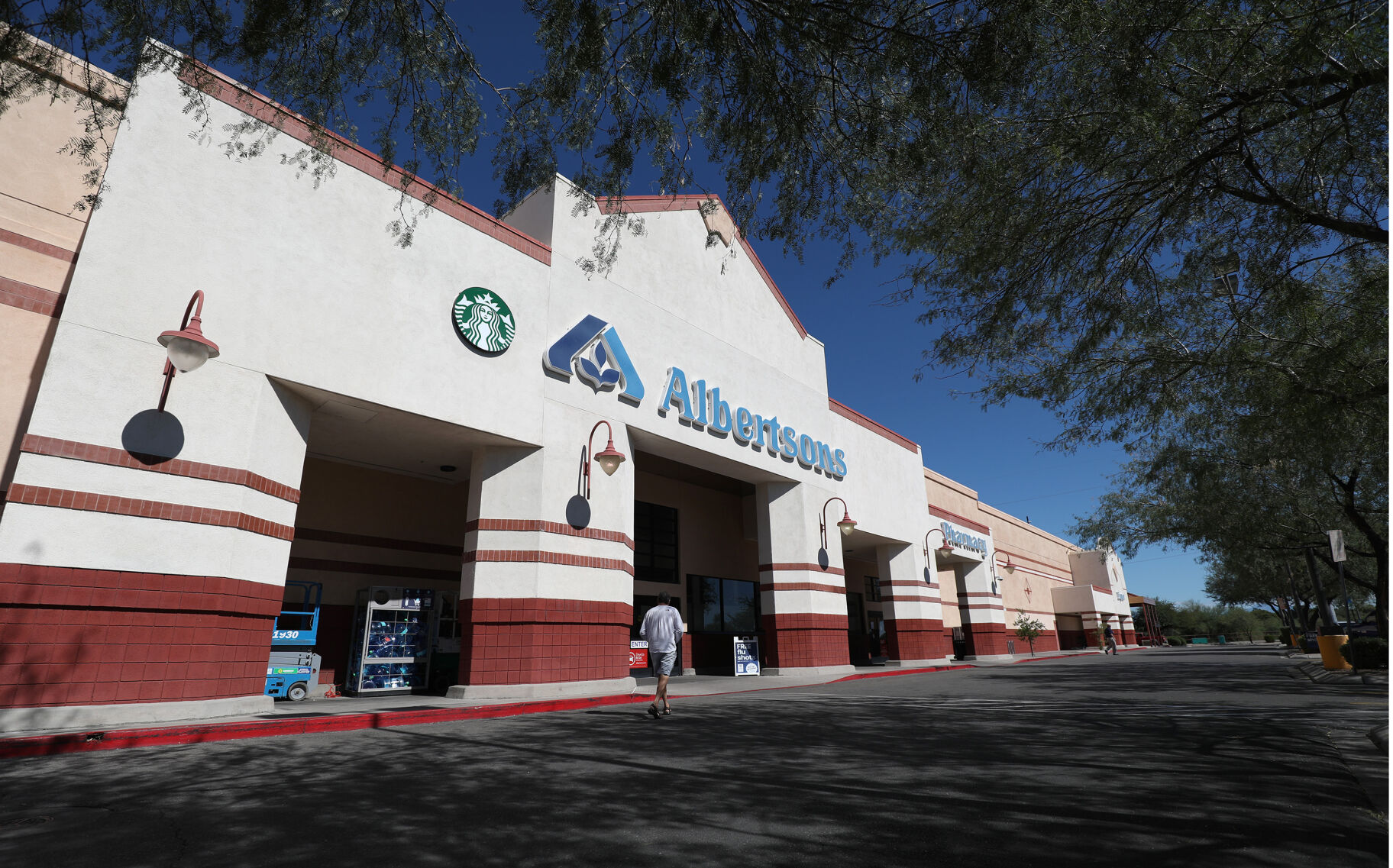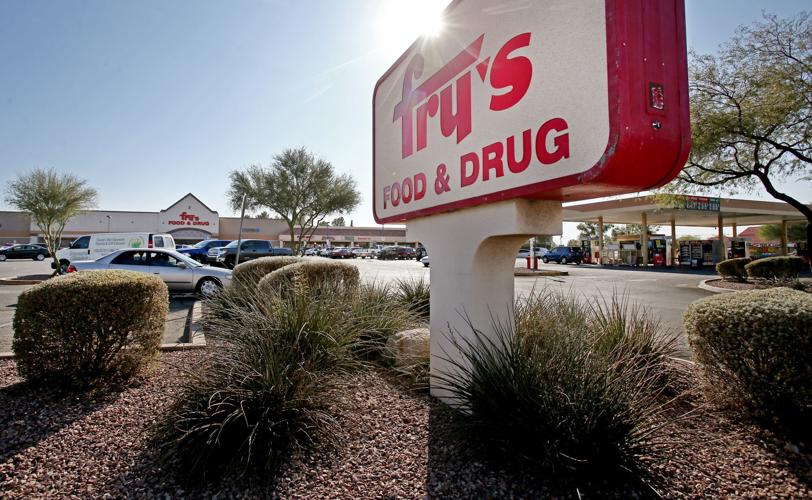PHOENIX — Gov. Katie Hobbs said Wednesday she is concerned about some effects on Arizona of a proposed merger of the state’s two largest grocery chains.
But Hobbs said she’s not ready to say whether she will oppose the combination of Kroger Co., the parent of Smith’s and Fry’s Foods, with Albertsons Companies, which operates not just stores under its own name but purchased Safeway and all the stores that company owned in 2015.
Her comments come as Attorney General Kris Mayes is conducting a probe into effects of the combination, not only on shoppers but on the estimated 35,000 workers at both chains.
Other Arizona officials are not waiting for that. Secretary of State Adrian Fontes and colleagues from six other states already asked the Federal Trade Commission to block the proposed $24.6 billion deal in which Kroger would purchase its competitor.
On Wednesday, a member of the state’s congressional delegation added his voice.
“I fear that, without competition in the grocery sector, large chains like the proposed Kroger-Albertsons conglomerate could monopolize entire regions of Arizona, then raise prices, close store fronts and eliminate jobs,’’ U.S. Rep. Ruben Gallego wrote to Lina Khan, who chairs the FTC. Hobbs, Mayes, Fontes and Gallego are all Democrats.
Gallego also gathered support for his position from several Southern Arizona mayors.
“I firmly believe that this particular merger could have significant negative impacts on our local economy, small businesses, and the well-being of our residents,’’ said Sierra Vista Mayor Clea McCaa.
Bisbee Mayor Ken Budge said he fears the deal could result in the closure of the Safeway store in his community.
And Douglas Mayor Donald Huish said he has seen how mergers affect small towns.
“In 2021, when Food City/Bashas merged with Raley’s, part of the merger included store closures,’’ including of the Food City in Douglas, he said. That left Walmart as the only grocery outlet, he said.
Hobbs not ready to take action
Hobbs, who said she shops at Fry’s, said she is watching.
“Combined, these are one of the largest employers in the state,’’ she said. “We’re concerned about potential loss of jobs and increasing prices, especially in rural areas that already have limited options for grocery stores.’’
Hobbs declined to say what she would want if she ultimately determines the merger is not in the best interests of the state.
One option would be to ask the FTC to block the deal entirely. There also has been discussion of requiring the newly formed company to spin off some of its stores to others to ensure some competition remains.
Hobbs sidestepped what she is thinking. “I’m not prepared to comment on that, just that we’re watching the situation,’’ she said.

.
Mayes finds widespread opposition
Mayes said Wednesday that a series of “town halls’’ she has conducted across the state seeking input on the deal produced a consensus of sorts.
“Nearly universally, I’ve heard opposition to the proposed merger, coupled with real concerns for potential job losses associated with combining the two companies,’’ the attorney general said. “I’ve heard from seniors on fixed incomes worried that grocery prices could rise if the merger goes through.’’
Access is another concern. Mayes said she’s heard from individuals, particularly in rural areas, that if a neighborhood grocery store were to close, that would force them to have to walk or drive much further to buy basic necessities. Even military families have concerns the merged entity might not accept their insurance to cover prescriptions, she said.
Mayes said she anticipates making a decision on what action to take, if any, by the end of the year, ahead of the scheduled 2024 date to complete the merger.
Anti-trust law cited
Arizona law forbids any “contract, combination or conspiracy by two or more persons in restraint of, or to monopolize trade or commerce.’’
When the deal was first announced, Mayes said she wanted to know whether the merger of the two grocery giants, at least in Arizona, meets that definition.
“The people of Arizona have important input to make here, people who live in the neighborhoods where a Fry’s or a Safeway or a Smith’s could be shut down,’’ she told Capitol Media Services at the time.
She said it isn’t just the people shopping there who might be affected.
“We’re going to be getting input from the dairy operators in Arizona and the farmers and cattle growers who are worried about the reduction in competition in Arizona and the reduction in the number of outlets for their products,’’ Mayes said.
Consideration of whether the merger violates state antitrust laws also takes into account what competition would remain in Arizona.
Bashas’ operates 118 stores, mostly in Arizona, under that name as well as Basha’s Dine Market, Food City and AJ’s Fine Foods. Walmart generally has more aggressive pricing than either Kroger or Safeway, though it does not put items on sale.
Kroger pledges investments
Kroger, in a statement earlier this year, said the merger “provides meaningful, measurable benefit to all stakeholders, including lowering prices, providing more choices and establishing a more competitive alternative to large, non-union retailers.’’ The last comment is in reference to Walmart, though not all Kroger stores are unionized, either.
On a website set up by the two chains, Kroger CEO Rodney McMullen said the deal will “deliver superior value to customers, associates, communities and shareholders.’’
It also says that after the deal is closed, Kroger will invest $500 million to lower prices, $1.3 billion into Albertsons stores “to enhance the customer experience,’’ and $1 billion “to continue raising associate wages and comprehensive benefits.’’
In their original announcement, the retailers said they are willing to divest up to 650 of the stores to overcome regulatory concerns. None of the possible locations have been announced.
When Albertsons bought Safeway, it agreed to sell 146 stores to Haggen, a regional grocer. But Haggen eventually went bankrupt and Albertson’s bought back many of the stores.
There’s also a question of whether anyone would be willing to buy the stores the new company is willing to shed, considering the possibility they are likely to offer up those that are least profitable.
Get your morning recap of today's local news and read the full stories here: http://tucne.ws/morning





